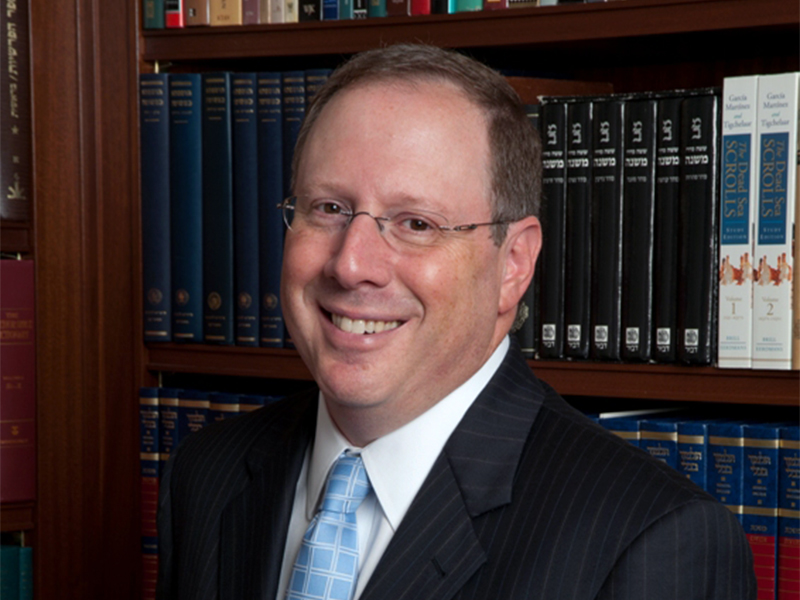
(RNS) — There is a rabbinic tradition that teaches that God reserves death on Shabbat for the truly righteous.
Of course, if Rabbi Aaron Panken heard that teaching now, he would probably say: “Aw, shucks … ”
We — the Reform Jewish community, American Jewry and all those who care about Judaism — are still in shock over the sudden, tragic death of Panken, president of Hebrew Union College-Jewish Institute of Religion, the Reform movement’s rabbinical school. Aaron was killed while piloting a small airplane near New York City this past weekend.
He was only 53 years old.
The tributes have been pouring in, and each one is richly deserved. They speak of his erudition, his scholarship, his wonderful ability to teach and touch, and to lead.
Above all else, those tributes speak of his unfailing menschlichkeit, his humanity. No conversation with Aaron, on the gravest and weightiest of matters, progressed very far before he would interject: “How is your family? How are your kids?”
And, unlike other “important” people, he knew their names.
Let me tell you about three times that Aaron taught me to look at the world in a different way.
I first met Aaron Panken more than 40 years ago. He was a teenager, and I was working for the Reform youth movement in New York City.
Aaron had grown up at Stephen Wise Free Synagogue on Manhattan’s West Side, and I spent many hours with him and his parents, Beverly and Peter, and his sister, Melinda, who would grow up to become the rabbi of Temple Shaari Emeth in Manalapan, N.J., at their apartment.
There was that late afternoon when the teen leaders and I met in his parents’ living room. We were discussing an upcoming regional youth event.
One of the kids asked: “What kind of mood are we trying to create at this program?”
My response: “Well, I would like it to be kind of laid-back, mellow … ”
(Hey, it was the ’70s.)
To which young Aaron Panken responded: “If the program is too laid-back and too mellow, then when we are looking for new leaders, people might be too laid-back and too mellow to apply.”
Aaron was right. If you want to raise up leaders, you can’t be laid-back and mellow. You have to offer them fire, and you have to nurture the fire that is within them as well.
The second time that Aaron taught me to view the world differently was several summers ago, when he lectured at the Shalom Hartman Institute in Jerusalem.
Aaron discussed the future of liberal Judaism in America. He described the broader cultural trends that were besetting American society — trends that were having deep implications on Jewish life.
Aaron pointed out that our country often focused only on immediate results, on short-sighted commitments.
- Wall Street: going from long-term results to day trading.
- The American response to climate change — or, rather, a lack of response.
- Foundations and philanthropists that will fund a three-year project — at which point, you are on your own.
And then, Aaron masterfully swung the conversation to the Jewish world.
He offered the example of synagogues that shorten their education programs to a one-day-a-week Hebrew school.
The leaders of those synagogues believe that they have to compete with other synagogues, and to keep their congregants happy.
Aaron posed the question: Did those leaders make the decision out of a sense of expediency, or did they think 10 years into the future, and what it would mean to lower the quality of Jewish education?
He was right.
Aaron taught me that expediency and popular decisions might feel good in the short run, but in the long run will yield very little.
There is yet a third way that Aaron taught me to view the world differently.
At least one other person has reflected on Aaron’s death by quoting Shakespeare — from “Hamlet”: “Good night, sweet prince, and flights of angels sing thee to thy rest!”
It is more than appropriate. Aaron was the sweet prince of our movement.
But my mind goes to a different Shakespeare line — from Macbeth.
As it was said of the death of the Thane of Cawdor: “Nothing in his life became him like the leaving it.”
Yes, Aaron loved Judaism, teaching, learning, planning, dreaming — all of that.
Aaron was a man of eternally boyish enthusiasms. He never let the role of scholar and seminary president get in the way of having other interests and passions.
Aaron reminded me, and many of us, to take Judaism seriously. Seriously — but not solemnly. He always had a sense of humor about himself — that genuine sense of “aw shucks” that belied just how profoundly admired and respected he was.
I always got the sense that even Aaron did not believe how much good he had done.
Aaron lived by doing what he loved. And, Aaron died doing what he loved as well.
Aaron reminded me that Torah is crucial, but it is not everything.
You need a life beyond the life of the mind and the life of the spirit.
Sometimes, you just want to have fun and joy, to experience wonder.
It was in those small, and great, things that Aaron was my teacher.
His loss is a wound in the Jewish body politic that will heal neither quickly nor easily.
To his wife, Lisa Messinger; to his children, Eli and Sam; to his parents and sister — may God comfort you.
Right about now, God is inviting Aaron to teach Talmud in the world to come.
Aaron is probably saying: “Me? Really?”
